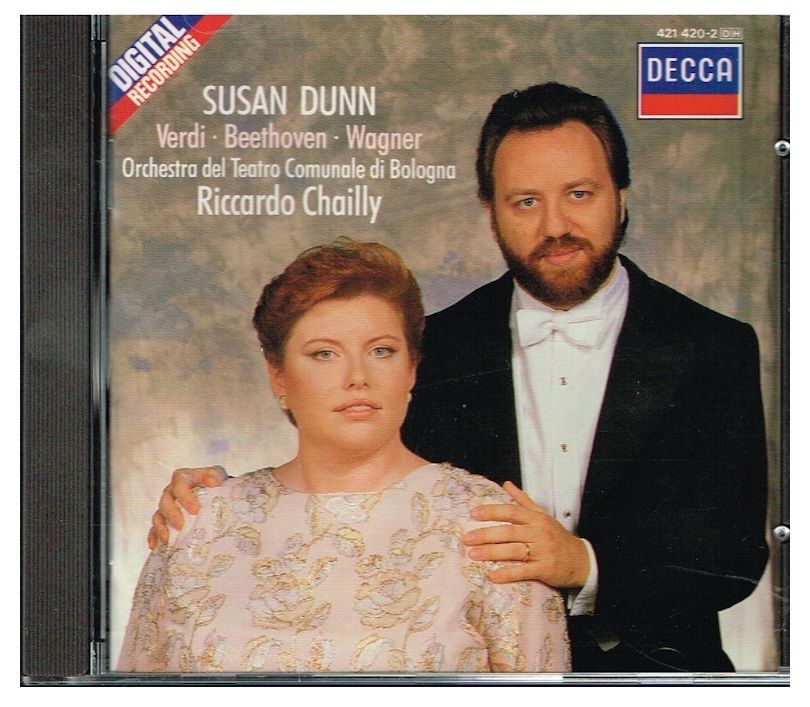

A native of Bauxite, Arkansas, soprano Susan Dunn (born July 23, 1954) is completely American trained, having studied at Indiana University in Bloomington and then at the University of Illinois privately with the renowned coach and accompanist John Wustman. During the final years of her studies, Dunn began to attract the attention of the music world and also to win prestigious awards: the D’Angelo Young Artist Competition, the Metropolitan Opera National Council Award and the Opera Company of Philadelphia/Luciano Pavarotti International Vocal Competition, and then in 1983 three major honors – The Richard Tucker Award, Chicago’s WGN-Illinois Opera Competition and the Dallas Morning News-G.B. Dealey Award. During her career, Dunn has achieved international success in Verdi, Wagner, Strauss and recital singing. She has demonstrated her gifts on the world’s most challenging stages: La Scala in Milan, where she made her debut in Aïda, New York’s Carnegie Hall, where she created a sensation in a concert performance of Act I of Wagner’s Die Walküre; at Lincoln Center’s Avery Fisher Hall where she appeared with the New York Philharmonic in the Verdi Requiem and Strauss’ Four Last Songs; with the Lyric Opera of Chicago as Leonora in Verdi’s La Forza del Destino; at Chicago’s Orchestra Hall in a concert performance of Verdi’s Simon Boccanegra; at the Vienna State Opera as Amelia in Un Ballo in Maschera and at the Australian Opera as Desdemona in Otello. She made her debut at the Metropolitan Opera in Il Trovatore in February of 1990. Dunn has recorded an album of arias for London/Decca Records with Riccardo Chailly conducting. She sings Tove in London’s recording of Schoenberg’s Gurrelieder and appears on that label’s recording of Mahler’s Das Klagende Lied, all with Maestro Chailly conducting. In addition to Act I of Die Walküre (with Lorin Maazel conducting) recorded for the Telarc label, Dunn is also the soprano soloist in their release of the Verdi Requiem. This recording, with Robert Shaw and the Atlanta Symphony, was awarded the Grammy as the Album of the Year of 1988. Her staged performances of Giovanna d’Arco and I Vespri Siciliani from Bologna, again with Maestro Chailly, are also available on video. Susan Dunn is Professor of the Practice of Music and Director of Opera in the Duke University Department of Music. Susan Dunn at Lyric Opera of Chicago
Susan Dunn with the
Chicago Symphony Orchestra1987-88 - Forza del Destino (Leonora), with
Giacomini, Nucci, Kavrakos, Sharon Graham, Andreolli; Conlon, Maestrini, Samaritani,
Schuler
1988-89 - Aïda (Aïda), with Giacomini/Lamberti, Zajick, Nimsgern, Giaotti; R. Buckley, Joël, Halmen, Schuler, Tallchief [Both concerts also featured the Chicago Symphony Chorus, directed by Margaret Hillis] October, 1988
- Simon Boccanegra (Amelia), with Nucci, Aragall, Estes; Solti
July, 1989 [Ravinia Festival] - All Beethoven Concert Ah! Perfido and Symphony #9 with Mentzer, Heppner, Cheek; Conlon -- Names
which are links refer to my interviews elsewhere on my website. BD
|
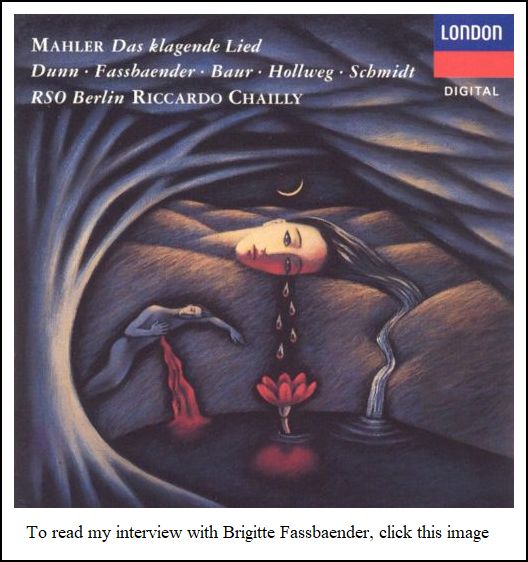 BD: Those hold no terrors for you?
BD: Those hold no terrors for you?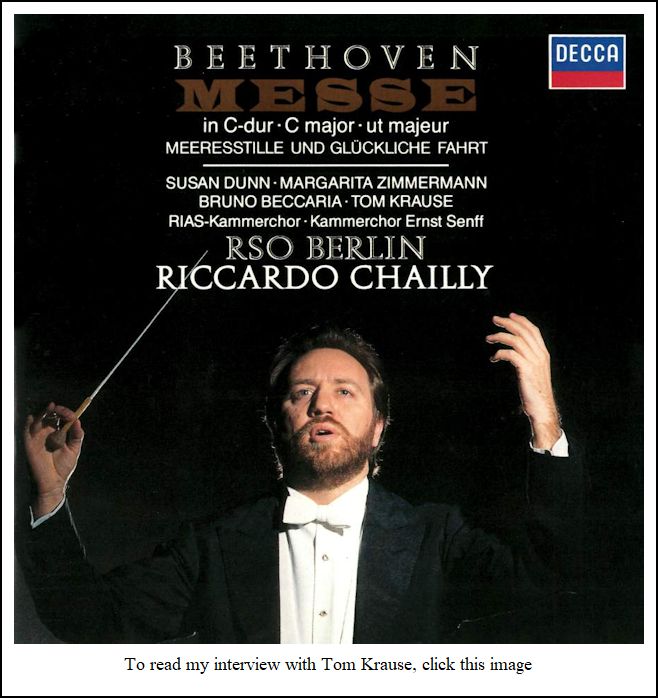 BD: [With a gentle nudge] And you’re looking
for a long career...
BD: [With a gentle nudge] And you’re looking
for a long career...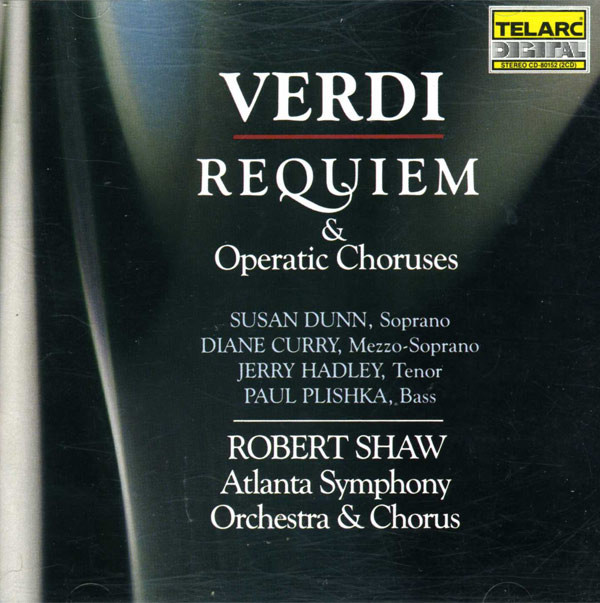 SD: I do recitals, and solo concerts,
and oratorio, just a little bit of everything.
SD: I do recitals, and solo concerts,
and oratorio, just a little bit of everything.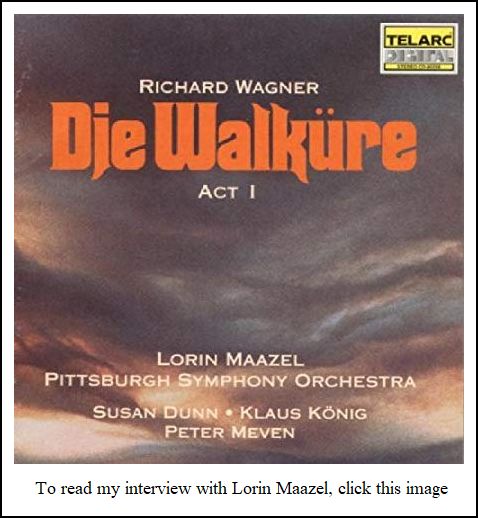 BD: Let’s talk a little bit about Wagner and then
we’ll go back to the Verdi. You’ve sung the first act of
Die Walküre in concert. Is that a satisfying thing
to do?
BD: Let’s talk a little bit about Wagner and then
we’ll go back to the Verdi. You’ve sung the first act of
Die Walküre in concert. Is that a satisfying thing
to do?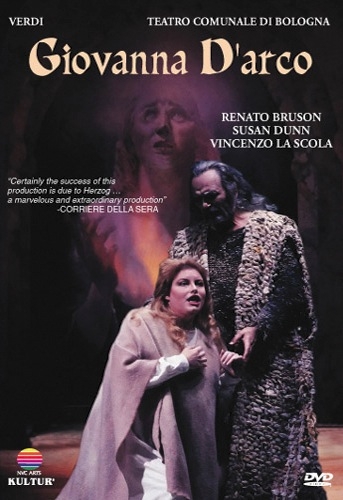 BD: Does the balance, perhaps, shift from some operas
to other operas?
BD: Does the balance, perhaps, shift from some operas
to other operas?[At this point, another singer could be heard warming up in the dressing-room next door.]
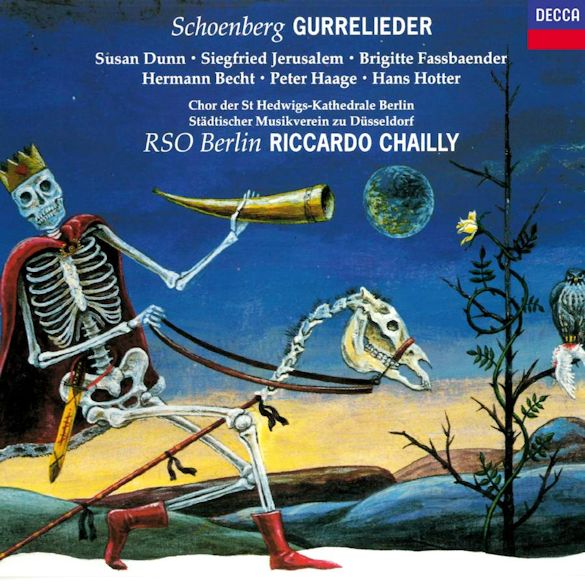 BD: Do you ever feel that opera’s becoming a contest
in those places?
BD: Do you ever feel that opera’s becoming a contest
in those places?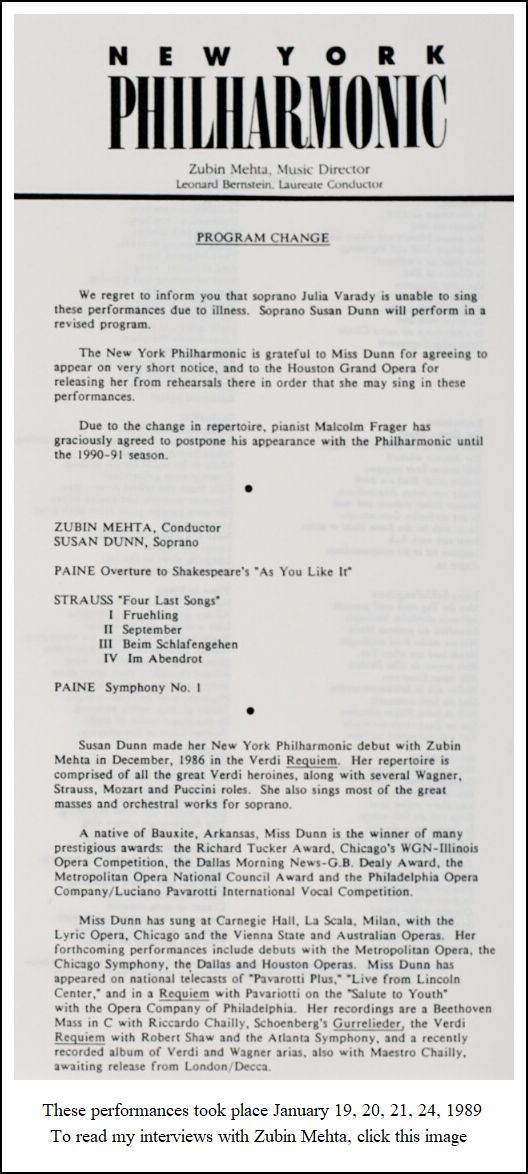 SD: I’m not sure it’s possible for
her to have changed any of that. That’s the fate part of
it. In looking at it again, I don’t think she’s weak. It’s
just that she’s uncertain about this future —
to leave her father and leave her home, that she’s no longer
living a lie. She can go away with this man that she probably hasn’t
known for very long, to a new country and an uncertain life. She’s
very young, and she’s going through the phase of growing away from her
home, and maybe if she had been older when all this happened it would have
been easier for her. But for her at that time, there was no other
way for it to happen.
SD: I’m not sure it’s possible for
her to have changed any of that. That’s the fate part of
it. In looking at it again, I don’t think she’s weak. It’s
just that she’s uncertain about this future —
to leave her father and leave her home, that she’s no longer
living a lie. She can go away with this man that she probably hasn’t
known for very long, to a new country and an uncertain life. She’s
very young, and she’s going through the phase of growing away from her
home, and maybe if she had been older when all this happened it would have
been easier for her. But for her at that time, there was no other
way for it to happen.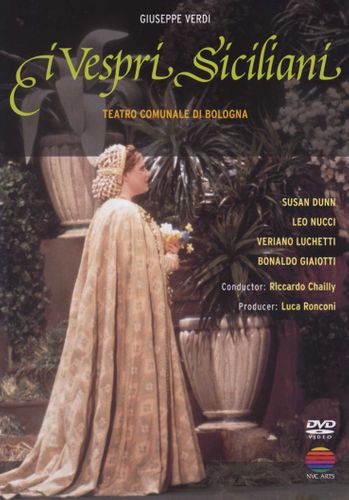 SD: She’s a hostage in a foreign country, and has been
through the death of her brother at the hands of a tyrant. She’s
most bound up in vengeance for her brother. and maybe because she’s
in love with Arrigo, she’s adopted the country of Sicily as her own, and
functions as an insider. She’s constantly trying to get the Sicilians
to take charge of their own affairs, rise up and throw out this foreign
government. She’s a little hot-headed, and tends to do things without
thinking them through very thoroughly. Considering the rather precarious
position that she’s in, she gets herself into a lot of trouble to the
point of almost having her head chopped off.
SD: She’s a hostage in a foreign country, and has been
through the death of her brother at the hands of a tyrant. She’s
most bound up in vengeance for her brother. and maybe because she’s
in love with Arrigo, she’s adopted the country of Sicily as her own, and
functions as an insider. She’s constantly trying to get the Sicilians
to take charge of their own affairs, rise up and throw out this foreign
government. She’s a little hot-headed, and tends to do things without
thinking them through very thoroughly. Considering the rather precarious
position that she’s in, she gets herself into a lot of trouble to the
point of almost having her head chopped off.
© 1988 Bruce Duffie
This conversation was recorded in Chicago on January 27, 1988. Portions were broadcast on WNIB a few days later, and again the following fall, and in 1994 and 1999. This transcription was made in 2019, and posted on this website at that time. My thanks to British soprano Una Barry for her help in preparing this website presentation.
To see a full list (with links) of interviews which have been transcribed and posted on this website, click here. To read my thoughts on editing these interviews for print, as well as a few other interesting observations, click here.
Award - winning broadcaster Bruce Duffie was with WNIB, Classical 97 in Chicago from 1975 until its final moment as a classical station in February of 2001. His interviews have also appeared in various magazines and journals since 1980, and he now continues his broadcast series on WNUR-FM, as well as on Contemporary Classical Internet Radio.
You are invited to visit his website for more information about his work, including selected transcripts of other interviews, plus a full list of his guests. He would also like to call your attention to the photos and information about his grandfather, who was a pioneer in the automotive field more than a century ago. You may also send him E-Mail with comments, questions and suggestions.